16 Aug 2012
Costa Coffee and the Market of Hope
I was recently in Santander, a major port city on the northern Spanish coast. While my kids were waking up in the hotel, my wife and youngest son went out in search of breakfast. Bereft of a map, we wandered in search of some fruit, and some pastries perhaps? Eventually, glancing round a street corner, I spotted what looked like it might be the corner of a market stall. On closer inspection, it turned out we had stumbled across one of the most remarkable food markets I have ever had the pleasure to wander around, El Mercado de la Esperanza, or ‘The Market of Hope’.
The market opened in 1904, and is widely regarded as one of the finest examples of iron architecture in Spain, being declared a historic monument in 1977. It is the largest market of its kind in Cantabria, the region of Spain in which Santander sits. Outside the market was a clothes market one had to pass through in order to get inside the building, which had little that was memorable, apart from a very tight-looking pair of men’s briefs with a picture of a large space rocket on the front and the word, erm, “rocket”. I didn’t buy them.
The market was on two floors. The lower floor featured seafood (“mariscos”) and fish (“pescados”), freshly caught from the Calabrian Sea. Shrimps, prawns, squid, muscles, big eel-like things, plaice, salmon, something called ‘bonito’ which I’m not sure what it is but it would take you a few meals to get through one, sardines, and some amazing-looking things that I had only ever seen in fossils. All laid out on ice, stall after stall after stall.
Upstairs was a more eclectic array of food. Fruit, vegetables, an amazing array of cheeses, bread and pastries, meats, cakes, eggs, honey, preserves, huge hams, all manner of pulses laid out in baskets. Rather than the kind of market I’m more used to, that sets up on trestle tables and is gone by the end of the day, this was a permanent market. It was open 6 days a week, all day (bar the traditional siesta break in the middle of the day), and each stall was its own business, each one probably kept within families for generations. There we no empty stalls.
We wandered around, buying a creamy goats cheese, some beautiful flat peachy things that are particular to that area, a bag of amazing greengages that dripped with a juice as sweet as honey, some local brie-type cheese that smelt like the worst teenagers’ trainers you ever had the misfortune to be in close proximity to but which tasted amazing, and some bread. I have been to similar markets, The English Market in Cork in Ireland, St. Nicholas Market in Bristol, and perhaps a couple of others, but El Mercado de la Esperanza blew me away.
The previous day news had reached me that Costa Coffee, the global coffee chain, has succeeded in getting planning permission to open a branch in my home town of Totnes in Devon, a story told brilliantly in a piece in today’s Guardian. Nothing unusual in that you might say, Costa are opening new branches everywhere, every day. What was particular to the Totnes Costa was that nobody wanted it. The ‘No to Costa’ campaign, which Transition Town Totnes was one of the key drivers of, had fought a creative, positive and very high profile campaign against the planning application to turn a former health food shop into a Costa. It also presented itself very much in the context of the positive vision of how our local economy could be that TTT has been working to achieve for the past 6 years, and which will be outlined in its forthcoming ‘Economic Blueprint’ for the town.
Our case was that our town has a unique culture of independent businesses, the Campaign for the Preservation of Rural England (CPRE) recently describing it as having “an extraordinarily rich local food web”, before warning “one large store can overwhelm a small town by capturing trade and threatening the viability of smaller traders in the town and nearby villages”. We were concerned that it would lead to the ‘Clone Town’ syndrome so visible in other towns and cities up and down the country, and would put local independent cafes out of business as well as creating a precedent that would lead to more chain businesses following them onto the High Street.
We had run the ‘Totnes Independent Coffee Festival’, a celebration of the 41 independent coffee outlets that the town already contains. The Festival concluded with a barista competition, where prizes were awarded for the best coffees produced and huge crowds turned up to celebrate the town’s independent coffee culture. A petition was signed by 5,700 people, out of a population of just over 8,000. The campaign’s ‘Clonestopping’ poster became iconic, appearing in most shop windows around the town as well as on t-shirts.
A large demonstration marched to the Council’s offices to demand the application be refused. The Town Council voted unanimously against it.
When Costa sent in their planning application, it was 300 pages long, crammed with case studies of planning cases they had won on appeal, clearly making the somewhat threatening point that it really wasn’t worth turning them down, as they always win on appeal. The campaign was widely praised as being one of the best such campaigns run anywhere. In the end, the District Council planner in charge of the decision recommended its approval, arguing that from a planning perspective, there is no difference between an independent coffee business and a chain one. The Mayor of Totnes told the BBC “I’m an extremely cross mayor and very disappointed and upset. We’re desperately striving here to try and keep the town as unique as we possibly can”, and the local MP said “Costa should recognise the damage they do to their own brand as well by imposing where they’re not welcome”.
Costa told the local radio station, “we are very excited to be opening a new shop in Totnes and very much look forward to becoming a strong part of the local economy”. Yet there is a distinct difference between the two, and a business such as Costa can never really be a strong part of the local economy. Here’s why (none of this will be new to regular readers but is useful to this piece).
You can think of a chain business like Costa as an extractive industry. It doesn’t source its milk (which it allegedly imports from Belgium), its coffee, its cakes or its biscuits locally, they are all delivered from Costa central. It doesn’t employ local solicitors or cleaners. When I spoke to Andrew Simms of new economics foundation, he told me:
“… they are interested in one thing, and that is sucking consumer spending to be extracted from the local economy, shuffled off to head office to pay to centralised logistics, and the expectations of remote, disinterested investors in the city. True independents bring economic health, they bring social glue, and they being a strong sense of place and identity”.
It might just be one branch of Costa, in one small town, but it is part of a larger story. 8,000 supermarket outlets now account for 97% of total grocery sales in the UK. Have a look at this graph from the recent Portas Review, showing the percentage change in UK store numbers between 2001 and 2011:
This is a trend, the closure of independent family businesses in droves while a small number of chain businesses come to monopolise our High Street, that diminishes local resilience and leaves us all more vulnerable. While we may be able to have a gingerbread mocha or whatever, around us families whose kids go to the same schools as our and who are committed to living in our community are losing their livelihoods, and our local distinctiveness is in decline. It’s not a good trade. In the Guardian piece, a Costa spokeswoman is quote as saying that the Totnes Costa will boost the town’s character “by adding vibrancy, complementing what Totnes currently offers”. In the comments section below, someone has written “True, that. Whenever and wherever I see a Costa, I think to myself: “Oh, look. That’s boosting the character of this place by adding vibrancy”.”
Walking round El Mercado de la Esperanza with my shopping, I was struck that the combined floorspace of the market was around that of a city centre supermarket for a city that size. Yet rather than one single business filling the space to service the interests of their distant shareholders and investors, here was a model for feeding the city from which many hundreds of families derived their livelihoods, in such a way that they had ownership over the destiny of their enterprises. While you could, if you wanted, buy well-known brands of fizzy drinks and of crisps there, they were generally tucked away on shelves at the back, the huge majority of what was available was locally sourced, intimately connected to the farmers, food producers and fishermen of the region. There was no Costa at the Mercado de la Esperanza, nor indeed did I see any chain coffee shops anywhere in the city centre. It was wonderful to see the diversity and the richness of what flourishes in their absence.
One of the arguments that had been aimed at the No to Costa campaign had been that this was an issue of choice, that Costa had the choice to come to Totnes and people had a choice whether to use it or not. The impression is given that to refuse a business such as Costa access to your fragile local economy is a negative thing. Yet wandering around the market in Santander, this argument falls away. What overrides it is the positive sense that it is a celebration of local food, local culture, fresh produce that you can have a relationship with, a shopping experience that allows you to meet people, to laugh and smile, to hear local news, to ask about what you are buying and how to cook it. This was a Market of Hope. A market where I could taste a future that brought the best of the past and the present with it. If the Totnes story marks a fork in the road, I only hope that in years to come we can look back and say that in terms of the Totnes Costa, we lost the battle but won the war, and that the Market of Hope had become the model for our local food economies, embodying David Cameron’s recent words:
“For our high streets to thrive they must offer something new and different. But for this to happen it is local people who must take control, developing the vision for the future of their high streets and putting their energy and enthusiasm into making it a reality”. Let it be so.
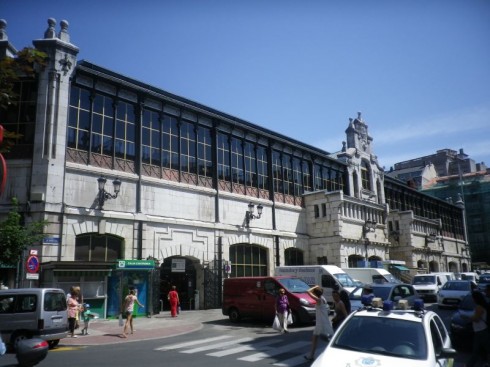
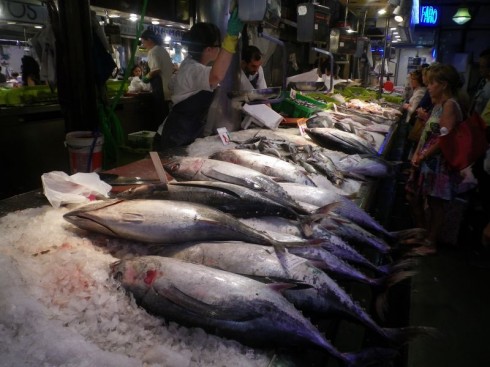
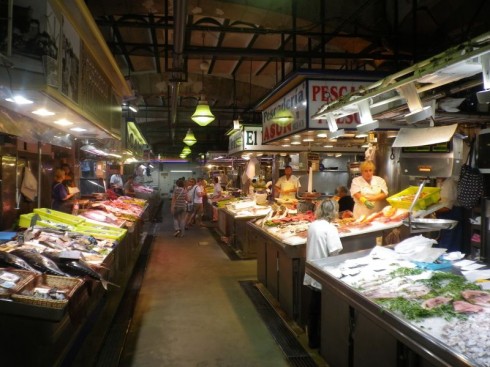
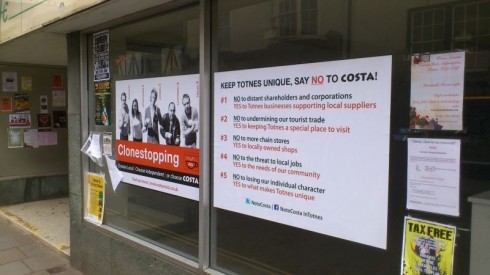
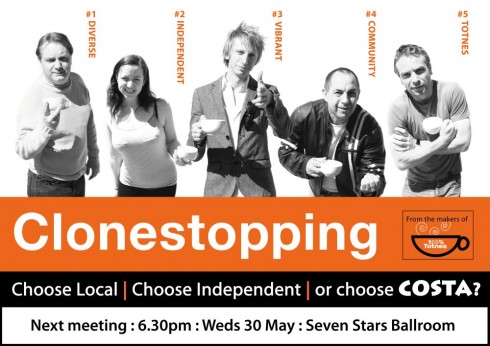

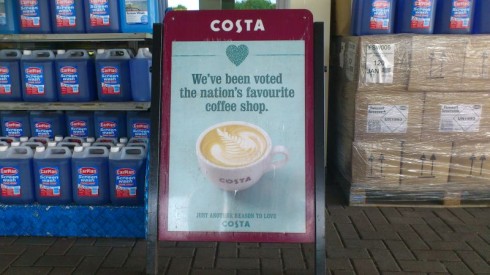
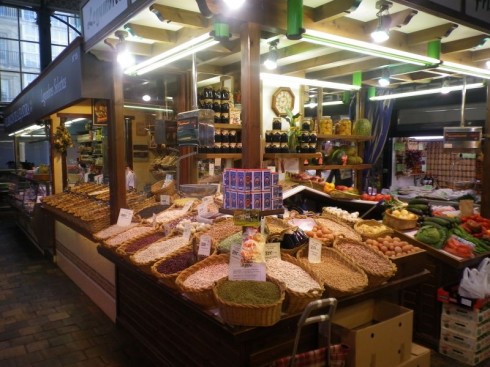
Jon Knight
16 Aug 9:41am
I have to say that if my Transition Town started a similar campaign I’d have to reconsider my support of it. From what I’ve read so far, this campaign appears to be a local protectionism, rather than a demonstration that local businesses can provide a healthy, competitive alternative to the global chains.
I’m all for encouraging local food production and distribution, but not if it isn’t sustainable. And sustainable means more than just grown organically and locally: it means that people are prepared to support it and use it. If they aren’t, it doesn’t matter if produce is grown in window boxes outside the shop and its the freshest, best tasting food going. Especially if when customers want to buy things the local shops are closed (which is one reason why I mostly shop in Sainsburys rather than local independent shops – Sainsburys is open when I’m not at work!).
The Guardian article and this posting just tells me that the folk of Totnes don’t think their independent shops are competitive or sustainable. If they were, they’d be welcoming a chain in to demonstrate how quickly it leaves when it doesn’t make any money, thus validating their sustainable, locally appropriate traders.
julia whatley
16 Aug 9:49am
I listened to the debate on radio 2 on Costa (alot) and Totnes. I said to my son I wonder what Rob has to say, a lot!! See ya at Off Grid I hope..
Nick Hart-Williams
16 Aug 9:53am
Love the words and photos on the market. So much more of that on the Continent – and still in London I guess. My first reaction was to say ‘have at look at the Guildhall Market here in Bath’- started in 1770’s and still 6 days a week – but took a look online and noticed only 4-5 food stalls today. As they say on their website (http://www.bathguildhallmarket.co.uk), “With the opening of supermarkets in the city the market has had to change with the times and has been dragged into the 21st century pretty smartly.” Still, well worth a visit – on the High St, just across from, uh, Costa Coffee.
Betty Dawes
16 Aug 11:36am
Interested in your piece about the Santander market. I hope to go to the area next year and will certainly visit the market. Costa coffee, No thanks.
We avoid it when we can. From now on we won’t touch it. Our boycot will not make any difference but I shall feel better about it. Don’t even like the stuff.
Paul Mackay
16 Aug 12:35pm
I visited Totnes for the first time last week and thought the high street was fantastic. I wonder if Totnes might be the first place to simply not go to Costa in sufficient numbers if they do open up? I hope they give up though. Have you thought about a Tweetup to hammer the message at Costa?
Mike Grenville
16 Aug 12:55pm
This should be a wake up call for other communities to prepare in advance for the arrival of chain stores. I wonder what the tipping point is for a place to become of interest to one. In Forest Row we have nearly 15 places you can buy coffee. Costa has also recently arrived within the Tesco petrol station shop, so not a competitor to the sit down coffee market.
Renee Last
16 Aug 1:53pm
Fantastic post, Rob. The Market of Hope lives up to its name.
We’re sorry to hear Costa have bulldozed their way into Totnes. We definitely won’t be going there next time we’re in town.
Totnes is always an inspiration to other transition towns. Big thank you!
Amanda
16 Aug 2:03pm
Totnesians can vote with their feet but the more difficult issue is how to get visitors to understand the need to boycott this unwanted and unneeded money spinning chain.
Helen
16 Aug 3:34pm
nice article Rob. We have a Costa in Stroud, despite protest. Many people use it so I guess we have a wide cross-section of community here with wide ranging views and lots of shoppers who don’t think about the cost to the local area.
I can’t wait for Tesco to close so we can put a permanent local market there instead, like the one in Santander. By the way, I’ve just moved my money from their bank to a building society – take that you big bank you!
Neil
16 Aug 4:05pm
I read the above and the article in the Guardian with interest. It driven me up the wall for years that you can go anywhere in the UK and it all looks the same. I therefore have every sympathy. To quote Bruce Cockburn
“The skin around every city looks the same
Miles of flat neon spelling well-known names
USED TRUCKS DIRTY DONUTS YOU YOU’RE THE ONE
Fat wheeled cars squeal into the sun”
As Rob has said their economic model is never going to work in a post oil world with “local” ingredients shipped thousands of miles.
Here in Edinburgh Princess St is a disaster if you look one way with ugly shop fronts for “well-known names” (if you look the other way its fantastic with a two art galleries, a park and a castle on a rock). Anyone reading this could write a list of shops on Princess St but away from Princess St the small independent shop and horrors like Costa do manage to co-exist. My kids love Costa but they also frequent the small independent food shops in their school lunch break (in fact these shops close for the entire school holidays!). The Westminster government is planning to make it easier for change of use to take place on high streets, in a way this is sensible, but if we end with large chains, sex and gambling shops it will be a disaster. Perhaps yes easier but only for independent start ups?
“No oil in the lamp” a peak oil book for Christians
Adrian Hepworth
16 Aug 5:38pm
I thought we are supposed to live in a democracy and that the majority vote stood for something. Rob quotes Cameron who claims he supports local business “But for this to happen it is local people who must take control.” If 5,700 people out of a total of 8,000 vote against something and it still goes against the MAJORITY vote,how is the local community supposed to take controi? Surely Cameron can see why the population has lost confidence in the governement. I don’t just mean this government but any government. Those figures show 75% against and there must have been a few that voted for so the total turnout must have been higher still. The government think they’re lucky if they get a 30% turn-out let alone 75% of the vote!
I strongly urge the inhabitants of Totnes to find out which local councillors voted for the planning application to be allowed and vote them out next time. Oh I forgot, there’s not much point in voting with results like this.
If it was the ‘threat’ of appeal made by Costa, aka Whitbreads, then the appeal system needs to be reassessed.
The trouble is we have Costa here in Tavistock and they do sell good coffee. We do use the other local cafes but some serve terrible coffee! The only justification for using a Costa is when there is no choice. By opening for longer hours they become the first choice You don’t need to know the opening times of the other outlets. It was even the choice for a local Transition group to go to after some event. I expressed my horror only to be told that Costa was the only one still open!
Claudia French
16 Aug 7:10pm
An interesting piece Rob. The reality is that in Spain (where i spent the past 8 years living), you have these amazing markets (just like the one you describe) in all the cities, all over the country, and most sizable towns too.
I quite agree with what you say about the market being “celebration of local food, local culture, fresh produce that you can have a relationship with, a shopping experience that allows you to meet people, to laugh and smile, to hear local news, to ask about what you are buying and how to cook it” and more, (although it really does help if you speak the language, for the finer points!)
It is one of the things we talk about in the “Caminata de Transición”, the Transition Walk, we dreampt up in Barcelona-en-Transición, as mentioned in the Transition Companion (p. 126). The local markets are on of the most important and traditional of all things in Spain – there’s one in every neighbourhood in Barcelona! Just think of that in other countries! I just hope that the people and the government there continue to appriciate them – and not continue to build supermakets inside the covered markets, as Barcelona city council have started doing reciently!
Long live the independant markets and cafes of this world – and the people who support them!
Kathy
17 Aug 8:40am
You might like this article about centering community development around food from the Project for Public Spaces. http://www.pps.org/setting-the-table-making-a-place-how-food-can-help-create-a-multi-use-destination/
Neil
17 Aug 10:05am
Strongly disagree with Jon. The people of Totnes are saying their 40 odd coffee shops are sustainable. Costa’s model with long supply lines for everything with presumably food items bought in this country going through a central warehouse are not in an age of peak oil. What we have seen again and again is large chains coming in and devastating small local business in small towns. In large cities as I posted above the two can coexist in some instances.
There is another argument which is equally valid and that is all our high streets end up looking the same, meaning you walk down a street and you could be anywhere.
Lastly we are back to Rob’s bucket argument that big chains suck all the money out of the area whereas locally owned ones don’t.
PS What’s going to happen to coffee when we going down the peak?
http://www.theoillamp.co.uk/
JamieB
17 Aug 10:55am
Apart from the amazing food, the brilliant thing about these daily markets in Spain is that the supermarkets just don’t get a look in in any major way because.
How many daily food markets are there in the UK? Near me in London we have the Ridley Road market (not exactly locally sourced but it is open daily).
Are there others? Is it simply too late to launch new daily markets? Do the supermarkets have too much of a strangelhold to make them viable?
Mike Grenville
17 Aug 12:25pm
The reason why countries such as Spain and France still have vibrant small food producers and traders is that the peasant class were not wiped out by the industrial revolution and the Enclosures Act as happen in the UK.
Diana Korchien
17 Aug 12:57pm
Bonito is tuna, for the record.
Steve Hall
17 Aug 4:22pm
RI want to write a response to the ‘well if people choose to go there’ crowd but I just can’t bring myself to. It is just too depressing. Can’t we just have one town where the chain stores are few and the independants are many? Can’t we just agree that sometimes ‘the market’ delivers bad things and…. oh god I cant continue. I am going to ring the bells at the local church. Not because it’s the best ring of bells in the county, not because I get any ego or financial reward for ringing them, not because it increases my standing in the community, but because I love it, and it is my church and I am human.
Dave Dann
20 Aug 8:16am
Beats me how anyone can write about retailing in Totnes without mentioning Morrisons supermarket. Surely that’s where most local people buy their necessities? Granted it’s a bit out of sight of the bijou area on the hill.
Coffee? Surely that’s not produced in the South Hams? Strange thing to make a fuss about. Have you no dandelion root? Can’t see why anyone would promote a ‘coffee culture’ and the ‘barista’ thing is just bizarre. It’s only coffee!
It all betrays a lack of resilience and a rampant nimbyism.
I can remember when London DID have local food markets. (Can remember buying dog food from the horsemeat stall). Veg shops sold fairly local produce and were very sparse. (2 types of spud – red and white – root veg and cabbage – salads in season from the Lea Valley or Channel Islands.)
This is not Spain.
Chantelle
20 Aug 7:05pm
I would love to visit Santander now!
Totnes is already saturated with coffee shops, a significant number which source their produce locally. If a large coffee chain such as Costa moves in and takes a share of this market and independent businesses lose market share as a result, the local food web will be damaged because Costa does not source locally. Then if Costa moving into Totnes creates a precedent for other chain food businesses to come to Totnes, the resilience of our community will be damaged further, which would be a great shame.
Coffee is not grown locally of course,but until dandelion coffee hits the mainstream, locally roasted beans and locally sourced milk are a realistic compromise.
Elizabeth James
21 Aug 12:57pm
I think Jon makes an entirely valid point and it’s a shame that more Transitioners have yet to take it up; if we don’t it will mean that we can never actually win against the big chains.
Don’t get me wrong, I rail as much as the next woman about the homogenisation of the high street, the extractive nature of businesses on the Costa-model which weaken local economies and the lack of real choice, also the shameful behaviour of local councils which are so evidently in thrall to big business.. etc etc.
But, the Costas of this world are evidently doing something right because people shop there. I conclude that they are offering what people actually want in the immediate term: a cup of a coffee in a pleasant environment and at a reasonable price.
So what is it that the non-Costas aren’t doing or should be doing differently to make them just as successful, or even more so?
Thus, the real questions for the Transition movement are: how to out-Costa the Costas? What is it that Costa gives people that they want and how to go one better?
(Not: how to shout at people louder that they SHOULD NOT BE SHOPPING AT COSTA.)
I can recommend this thought-provoking article on the parallels between mass production, large chains and efficiencies in healthcare services:
http://www.newyorker.com/reporting/2012/08/13/120813fa_fact_gawande
Adrian Hepworth
21 Aug 3:41pm
“Its only coffee!” How very dare you? Being serious for s moment I can understand if you don’t like coffee but the product is not the point. Ok its not grown in Devon but when we ran a cafe we made sure our coffee was at least ground, packed and distributed in the SW. I know Cornwall is considered by some to be a foreign country but we bought our coffee there.
The trouble with trying to keep everything local is it can only be acheived if its available locally. If I was to start selling ‘loal coffee’ again we’d return to the same supplier but as the supplier only sells to the trade it would not be available in the high street. It also has to be a good coffee and one of a variety choice.
The Barrista thing would not interest a non coffee lover but there is a skill to get the water temp correct, the amount the fineness of the grind, the amount the grounds are compressed and the time allowed for the water to pass though it. All because people got impatient when waiting for the traditional filter coffee! Personally I think espresso was invented to make use of coffee dust left from grinding filter coffee. It could never be used in a filter as gravity is not enough. The water would just sit on top of a coffee paste unless pumped through.